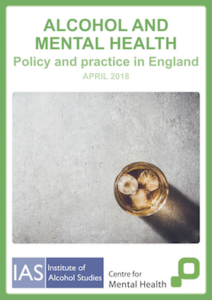View this report

Many people who misuse alcohol also have a mental health difficulty, and many people with mental health problems also misuse alcohol. Yet few get effective help from either alcohol or mental health services.
National policies relating to alcohol make scant reference to mental health, while national mental health policies pay little regard to alcohol. Guidance documents for both recommend integrated help for people with co-occurring difficulties but there is no strong incentive to implement this approach in practice.
IAS and the Centre for Mental Health jointly surveyed people working in alcohol and mental health services to understand current provision and the barriers to effective help. We also co-hosted a seminar for experts in both fields and reviewed current policies and guidance in each.
Our survey found that most staff, in both alcohol and mental health services, felt that support for people with co-occurring conditions was poor. Support for homeless people was consistently the biggest area of concern. Our survey also found that trust and understanding between alcohol and mental health services were weak. Alcohol service staff were, however, overall more critical of mental health services than vice versa. Barriers to greater integration included funding and workforce shortages (especially in alcohol services through lack of training), and the stigma facing people with co-occurring conditions. These findings were echoed in the seminar.
Improving support for people with co-occurring conditions will require action at every level, from national policy to local service delivery. It needs concerted action where possible to prevent co-occurring problems in the first place, alongside continued effort to challenge stigmatising attitudes and build the capacity of the workforce in both services to identify and meet people’s needs more effectively.
We recommend:
The UK Government should urgently develop a comprehensive alcohol strategy and commit, alongside NHS England, to a second Five Year Forward View for Mental Health.
The alcohol strategy should include both population level measures to address alcohol harm (including on price, marketing and licensing) and service level action to ensure more people get effective joined-up help. The strategy should include specific commitments regarding alcohol’s role in mental health problems and the difficulties faced by those with comorbidities. The Five Year Forward View for Mental Health should include action to address the relationships between alcohol and mental health, including access to effective help for people with co-occurring conditions.
This report has also identified further recommendations, relating to specific aspects of mental health and alcohol policy and practice. These recommendations should be enacted urgently and continued action on these should be covered within the alcohol strategy and Five Year Forward View previously discussed:
- The Department of Health and Social Care, NHS England and Public Health England should urgently review the funding of addiction services and the provision of support to people with co-occurring mental health conditions.
- Sustainability and Transformation Partnerships and emergent Integrated Care Systems should develop plans for improved support for people with co-occurring mental health and alcohol problems. These should bring together the commissioners and providers of relevant services and those using them to agree plans for developing integrated support.
- Local suicide prevention plans should include action to address the links between alcohol misuse, deliberate self harm, and deaths by suicide.
- Health Education England should ensure that all trainee psychiatrists receive training and undertake placements in addiction services (which could include those in the voluntary sector).
- Alcohol liaison services in general hospitals should seek to identify people who are misusing alcohol and refer them to appropriate support from local services.
- The Improving Access to Psychological Therapies (IAPT) programme nationally, and CCGs in local areas, should ensure that people with co-occurring alcohol difficulties are not excluded from psychological therapy services.
- The Department of Health and Social Care and Public Health England should commission a national anti-stigma campaign to dispel myths about people with co-occurring problems, including specific work to address professionals’ attitudes and behaviour alongside work targeting public opinion more broadly. This should be combined with efforts to reduce the ‘normalisation’ of alcohol as a form of self-medication for dealing with stress and distress.
- Research funders should commission economic analysis of the costs of comorbidity of alcohol and mental health difficulties. This should include analysis of how public money is being spent and how this might be improved.
View this report
